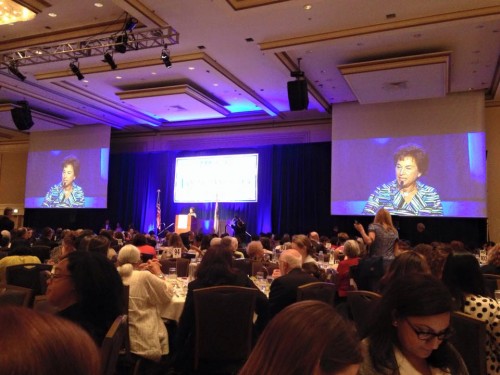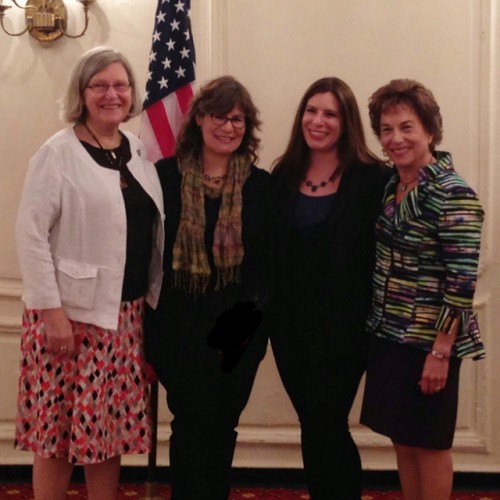By Rosemary Heilemann
On Monday, May 18, the International Ballroom at the Chicago Hilton was packed from corner to corner at Congresswoman Jan Schakowsky’s 14th Annual Ultimate Women’s Power Lunch. Even more than the numbers, the enthusiasm and energy of more than 2,000 strong women and the men who admire them, including dozens of Tenth Dems, threatened to burst the very walls.
Co-hosts Josina Morita, former candidate for the Metropolitan Water Reclamation District, and Hon. Stephanie D. Neely, former treasurer of the City of Chicago, welcomed the crowd warmly and read a moving letter of encouragement from Hillary Clinton. Then, after acknowledging candidates and elected officials, our host delivered her prepared remarks.
Rep. Schakowsky talked about growing up in Rogers Park. She described a time when ordinary working people could live comfortably, without worrying about putting food on the table, reasonably expecting that their children would live a better life than theirs. She contrasted that time with ours, a time when, in the words of AFL-CIO President Richard Trumka, “most families come home to a full plate of worry.” Yet, Rep. Schakowsky said, the United States has never been wealthier. Since 1980, GDP has grown by 77 percent and worker productivity has increased by 75 percent.
The bad news? Despite our national prosperity, 80 percent of workers have seen no improvement in their standard of living. The excess money from all this productivity has mostly gone to the top one percent of earners. At the same time, this year’s federal budget has cut 40 percent from health and welfare programs, including SNAP (food stamps), that will hurt one million people. These policies are bad for the people and bad for the economy. When working people get paid, they spend most of their income, which stimulates the economy. It is estimated that the $1.3 trillion in excess earnings of the highest paid individuals would create 10 million jobs if that money were actually spent.
But Rep. Schakowsky followed this dismal picture with good news. Federal tax laws and changes in government regulations over many years have created our lopsided economy, and loopholes and policies that created economic inequality can be undone. The Democratic Women’s Congressional Caucus, adopting the theme “When Women Succeed, America Succeeds,” is writing bills to address economic inequality, bills calling for increases in social security benefits; government-supported child care, pre-school, and elder care; support for women entrepreneurs; and reduction of college debt.
There is a renewed progressive mood in the country, Schakowsky said. Studies have shown that progressive ideas such as closing corporate loopholes, increasing capital gains taxes, increasing the minimum wage, providing true pensions, reforming immigration, and imposing higher taxes on millionaires and billionaires are popular. Women are tending to vote Democratic because they are looking for candidates who understand their issues.
Elections really matter, and the key is to engage the electorate. Only one-third of eligible voters turned out for the 2014 election. “We are smart enough, strong enough, and determined enough to make changes in 2016,” Schakowsky said.
Rep. Schakowsky yielded the floor to Saru Jayaraman, co-founder of ROC United, a group fighting for improved conditions for restaurant workers. Ms. Jayaraman told us that one-twelfth of American workers are restaurant workers, the lowest paid of all occupations. Because of exceptions successfully lobbied for by the restaurant industry, the minimum wage for such tipped workers is well below that legislated for other workers—$2.13 per hour under federal law and $4.95 in Illinois. In her allotted five minutes, this dynamic young woman made the case for eliminating this discrepancy, explaining that by designating workers as “tipped,” restaurant owners relieve themselves of the obligation to pay a living wage.
In the wake of these dynamic introductory speakers, keynote speaker Sister Simone Campbell came to the podium. Well-known since 2012 for her “Nuns on the Bus” national tour, Sister Simone spoke calmly and softly, with the confidence of one who has been a registered lobbyist, speaker, educator, and activist since 1978. Her message was that every one of us can accomplish something if we engage with others. Change, she said, requires that we build relationships, learn people’s stories, and then tell those stories—in short, open our hearts and then “gossip.” People are hungering to belong to something, which is why they sometimes get attached to leaders who do not serve their best interests. Sister Simone encouraged us to build a sense of community with people we encounter, to ask questions about their lives, and to learn and share their stories.
Sister Simone’s remarks invoked a palpable sense of community in the ballroom, and her quiet confidence inspired optimism. Such group experiences strengthen our determination to continue to work for the changes that will benefit our country and its people. This was my first Ultimate Women’s Power Lunch, and it surely will not be my last.


